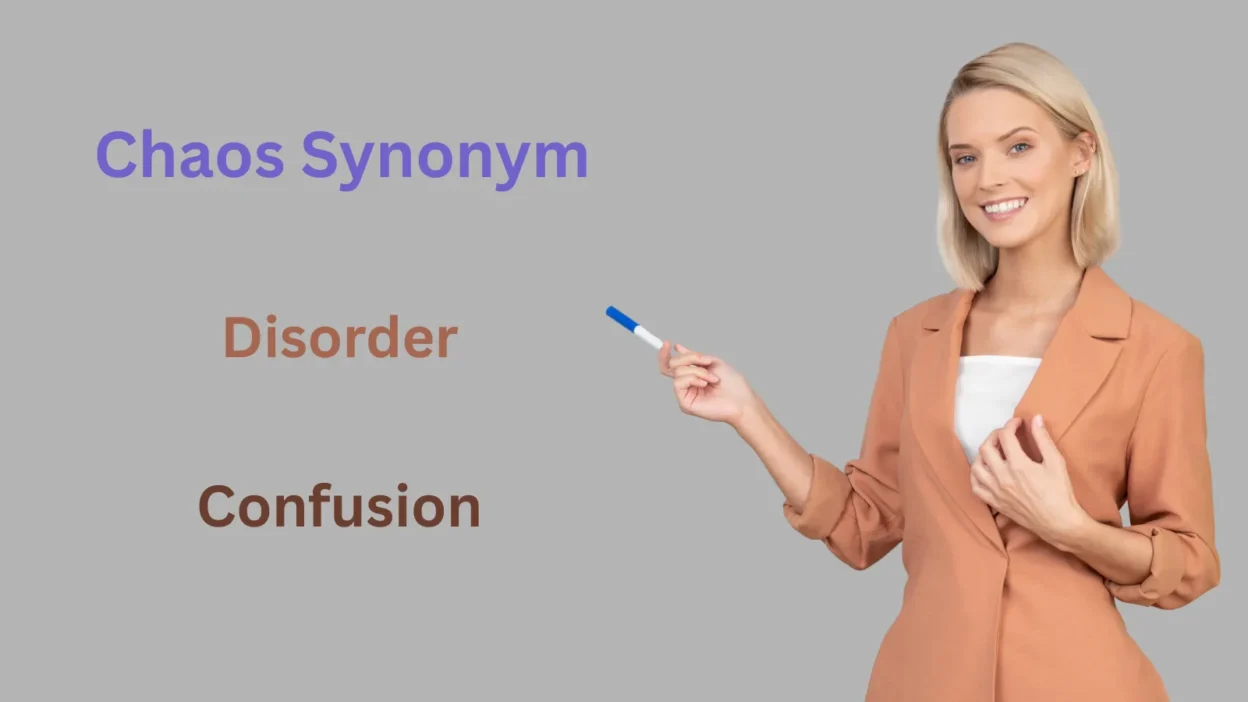Chaos synonym words like disorder, confusion, and turmoil express the idea of complete disorganization, lack of control, or unpredictability.
For example, you might say, “The room was in complete disorder after the party,” or “The sudden storm caused total turmoil.”
Each synonym highlights a different kind of instability—whether emotional, social, or physical.
If you’re writing about conflict, mess, or unpredictability, using the right synonym for chaos helps your tone sound vivid, powerful, and precise.
In this guide, you’ll explore the meaning and example sentence for each chaos synonym, along with tips on when to use them—whether you’re describing emotional confusion, political unrest, or everyday disarray.
Understanding the Word “Chaos”
The word “chaos” means complete confusion or disorder, often describing a situation where normal control or order breaks down.
It can apply to both physical mess and emotional or social upheaval.
For example:
- The traffic was pure chaos after the accident.
- The company fell into chaos after the CEO resigned.
Depending on the context, chaos can sound dramatic, emotional, or literal, and each synonym brings its own tone and intensity.
30 Synonyms of “Chaos” with Meanings, Examples, and Usage Tips
Disorder
Meaning: A lack of organization or arrangement.
Example: The files were in total disorder on the desk.
When to Use: For physical or structural mess.
Confusion
Meaning: A state of not understanding or being unclear.
Example: The sudden announcement caused confusion among employees.
When to Use: For emotional or mental uncertainty.
Turmoil
Meaning: A state of great disturbance or agitation.
Example: The country was in political turmoil for months.
When to Use: For emotional, political, or social unrest.
Pandemonium
Meaning: Wild uproar or noisy confusion.
Example: Pandemonium erupted when the concert began.
When to Use: For loud, uncontrollable, or crowd-based chaos.
Havoc
Meaning: Great destruction or disorder.
Example: The storm wreaked havoc on the coastal towns.
When to Use: For damage or natural disaster contexts.
Anarchy
Meaning: A state without government or control.
Example: The revolution led to temporary anarchy.
When to Use: For political or societal breakdowns.
Bedlam
Meaning: A scene of noisy confusion and uproar.
Example: The classroom turned into bedlam after the announcement.
When to Use: For noisy, playful, or hectic situations.
Disarray
Meaning: A lack of order or tidiness.
Example: Her thoughts were in disarray after hearing the news.
When to Use: For emotional or organizational confusion.
Mayhem
Meaning: Violent disorder or chaos.
Example: There was mayhem in the streets after the game.
When to Use: For violent or destructive events.
Uproar
Meaning: Loud noise or strong public reaction.
Example: The crowd’s uproar could be heard blocks away.
When to Use: For noisy protest or emotional disturbance.
Commotion
Meaning: Sudden noisy movement or disturbance.
Example: The commotion outside drew everyone’s attention.
When to Use: For quick, physical, or social disturbances.
Disorganization
Meaning: Lack of systematic structure or efficiency.
Example: The event’s disorganization caused major delays.
When to Use: For management or planning failure.
Bedragglement
Meaning: Messiness and untidiness, often physical.
Example: After the rain, the hikers returned in total bedragglement.
When to Use: For appearance-related or descriptive writing.
Entropy
Meaning: Gradual decline into disorder or randomness.
Example: Without maintenance, the system fell into entropy.
When to Use: Scientific, philosophical, or metaphorical contexts.
Disruption
Meaning: A disturbance that interrupts normal flow.
Example: Internet disruption halted business operations.
When to Use: For interruptions or technological breakdowns.
Tumult
Meaning: Loud, confused noise by a crowd or chaos of emotion.
Example: Tumult filled the hall as the results were announced.
When to Use: For emotional or crowd-based energy.
Unrest
Meaning: A state of dissatisfaction or agitation.
Example: Social unrest spread after the policy change.
When to Use: For political or social issues.
Discombobulation
Meaning: A humorous term for confusion or disorder.
Example: His sudden question caused total discombobulation.
When to Use: Informal or humorous tone.
Madness
Meaning: Extreme confusion or irrational behavior.
Example: The stock market’s madness confused even experts.
When to Use: For emotional or metaphorical chaos.
Mess
Meaning: A dirty or disorganized state.
Example: The kitchen was a mess after baking day.
When to Use: Casual or physical tone.
Turbulence
Meaning: Violent or unsteady movement or emotion.
Example: The airplane hit turbulence mid-flight.
When to Use: Physical, emotional, or metaphorical writing.
Confoundedness
Meaning: Bewilderment or complex confusion.
Example: He looked at the puzzle in total confoundedness.
When to Use: Formal or literary contexts.
Frenzy
Meaning: Intense, uncontrolled excitement or activity.
Example: Shoppers were in a frenzy during the sale.
When to Use: Emotional, social, or commercial tone.
Muddle
Meaning: A confused or disorganized mix.
Example: The instructions were a complete muddle.
When to Use: For mental or process confusion.
From flirty texts to professional responses, Replyylines.com delivers ready-to-use lines that make conversations easy and fun.
Discombobulation
Meaning: Total confusion or bafflement.
Example: His reaction led to complete discombobulation in the room.
When to Use: Light-hearted or creative writing.
Tumultuousness
Meaning: The quality of being noisy, confused, or disorderly.
Example: The tumultuousness of the crowd was overwhelming.
When to Use: Formal or descriptive writing.
Confounded Chaos
Meaning: A mix of surprise and disorder.
Example: The magician’s trick caused confounded chaos on stage.
When to Use: Dramatic or expressive writing.
Topsy-Turviness
Meaning: Upside-down or completely disorganized state.
Example: The plan turned topsy-turvy after the sudden change.
When to Use: Informal, descriptive, or playful tone.
Derangement
Meaning: Mental or systematic disorder.
Example: The system’s derangement caused total shutdown.
When to Use: Technical or psychological contexts.
Bedlamite Energy
Meaning: Wild, uncontrollable energy causing disorder.
Example: The crowd’s bedlamite energy filled the stadium.
When to Use: Creative or expressive language.
Choosing the Right Synonym for “Chaos”
Choosing the right synonym depends on tone and purpose:
Formal or Professional Writing: disorder, disarray, disruption, disorganization
Dramatic or Emotional Tone: turmoil, frenzy, pandemonium, mayhem
Social or Political Contexts: unrest, anarchy, tumult, upheaval
Casual or Everyday Use: mess, confusion, commotion, topsy-turvy
Scientific or Metaphorical Writing: entropy, turbulence, derangement
Cultural Tip
In modern English, chaos often conveys loss of control, but the tone varies.
In serious writing, disorder or turmoil feels more formal.
In casual use, mess or confusion keeps it simple and relatable.
Writers often use pandemonium or mayhem to add energy and drama.
Conclusion :
Chaos synonym words capture the many shades of disorder, noise, and unpredictability.
From quiet disarray to full-blown mayhem, each synonym helps express a different kind of confusion—mental, social, or physical.
Choosing the right alternative helps your writing sound more vivid, dynamic, and expressive.
Whether you’re describing emotional storms, political upheaval, or daily messes, mastering these synonyms turns disorder into powerful description.





